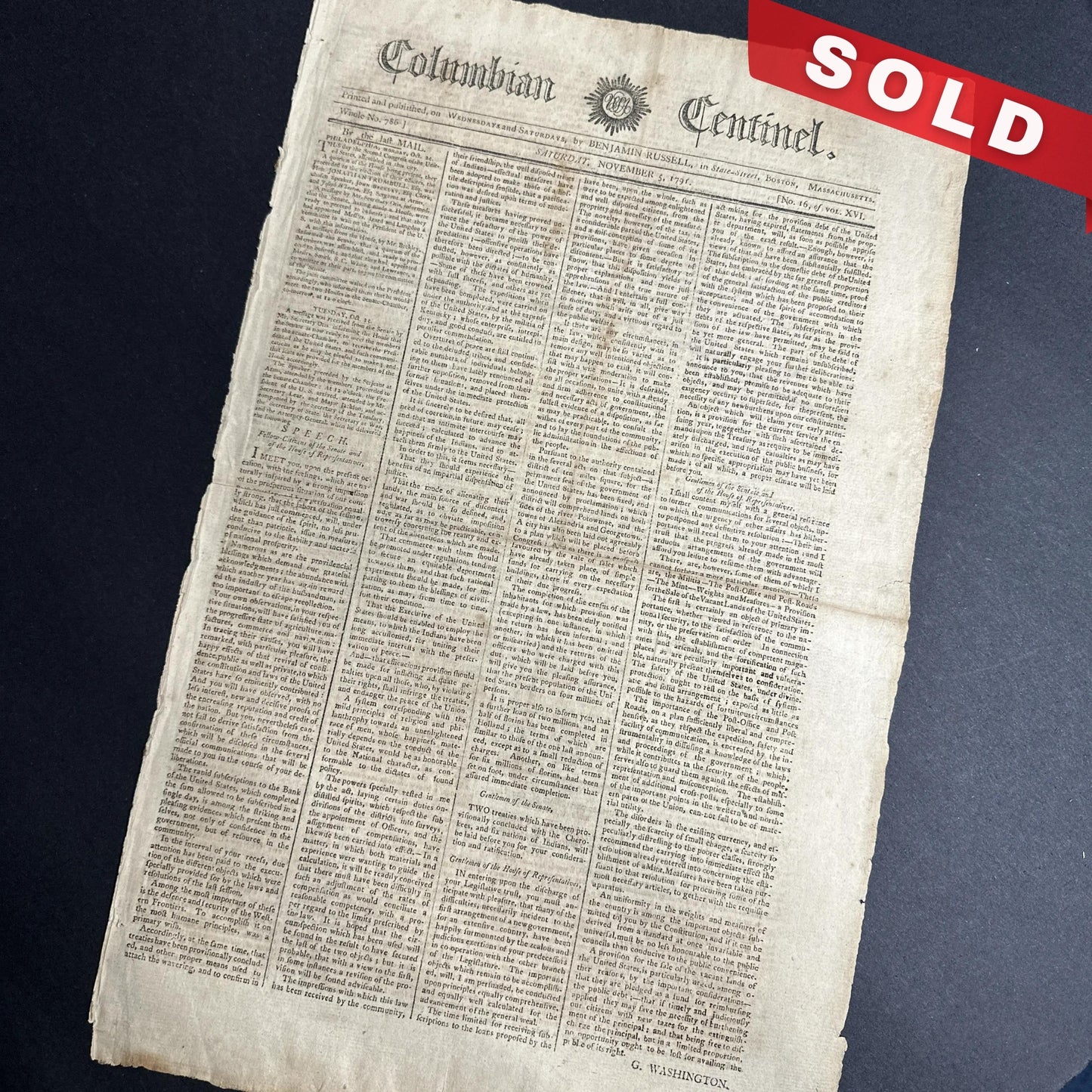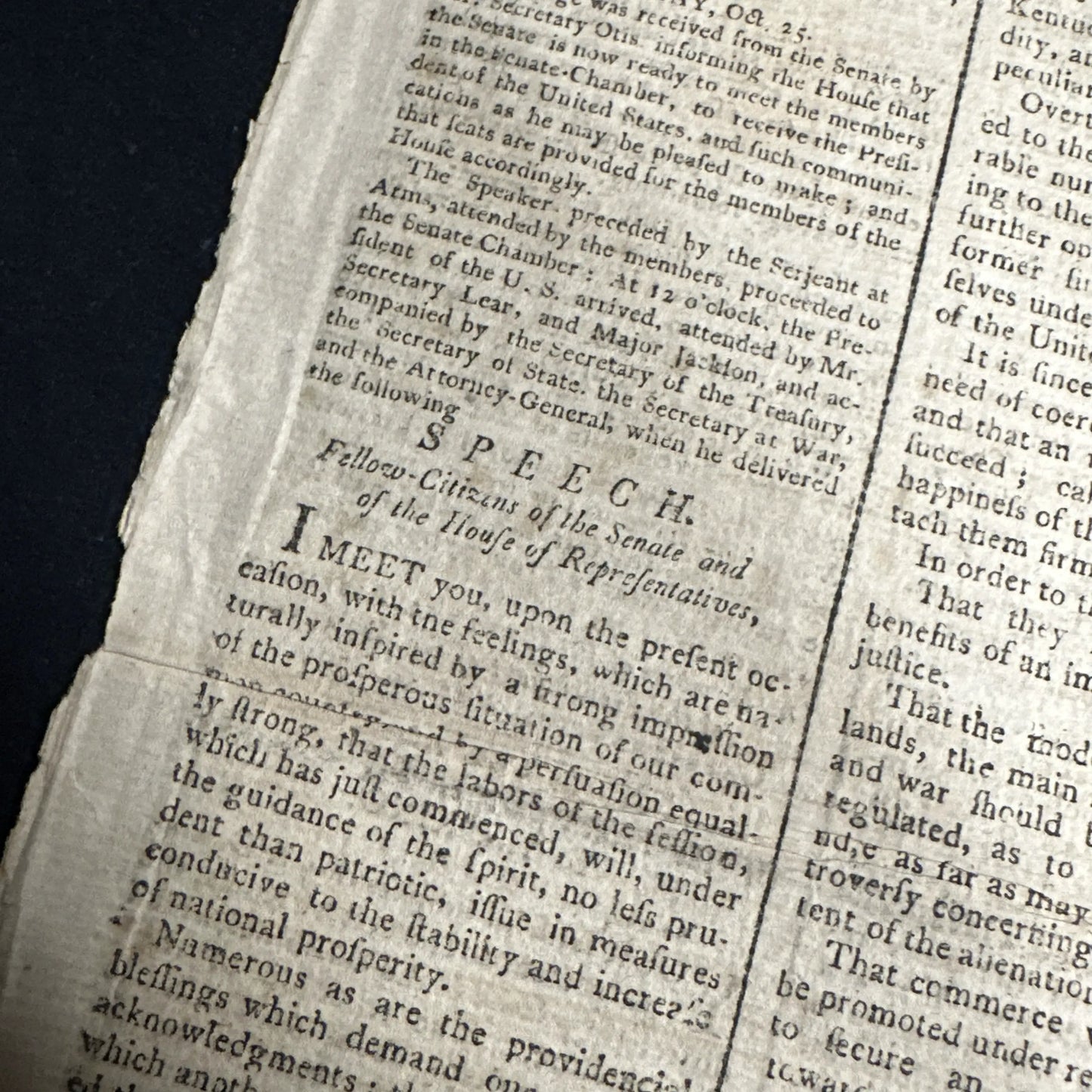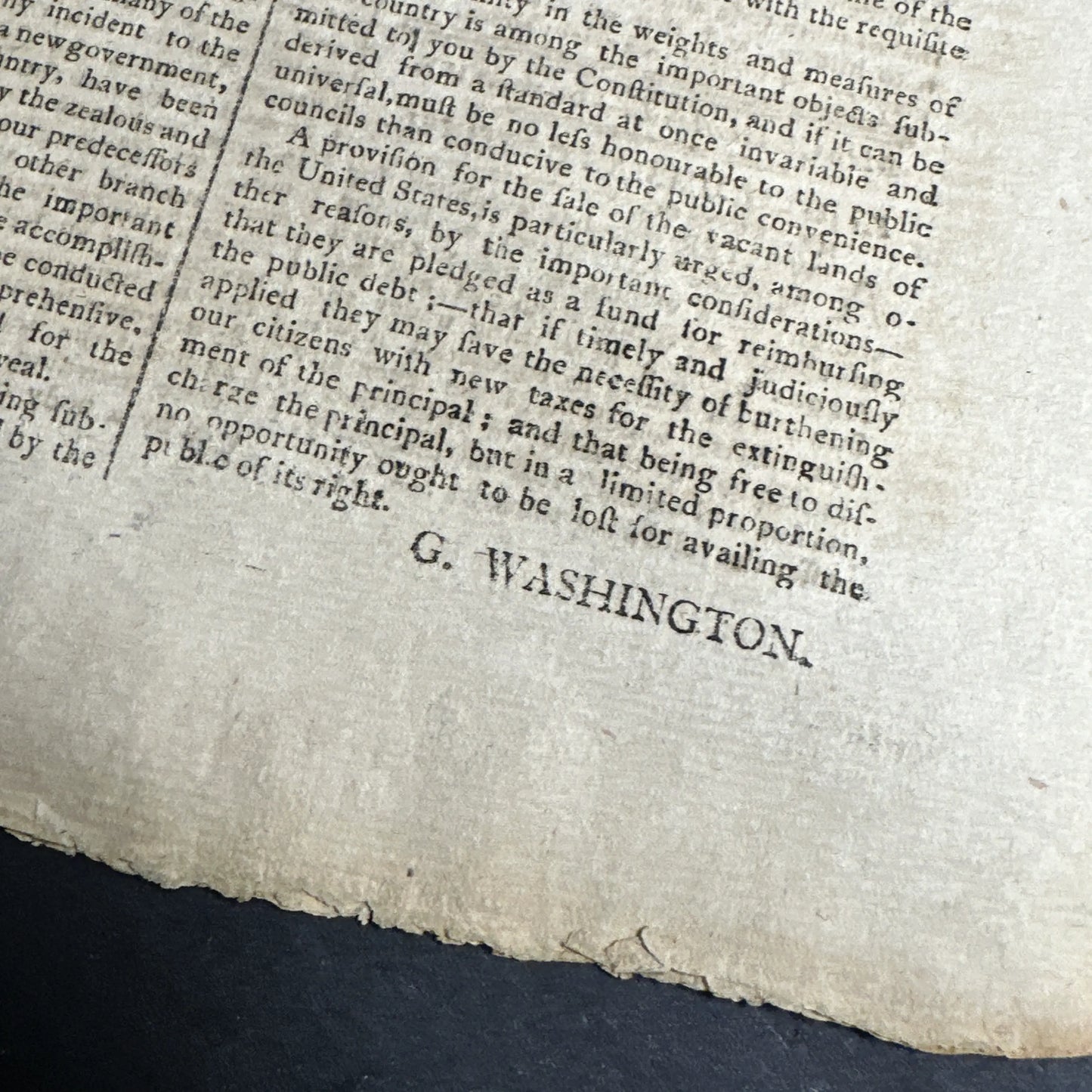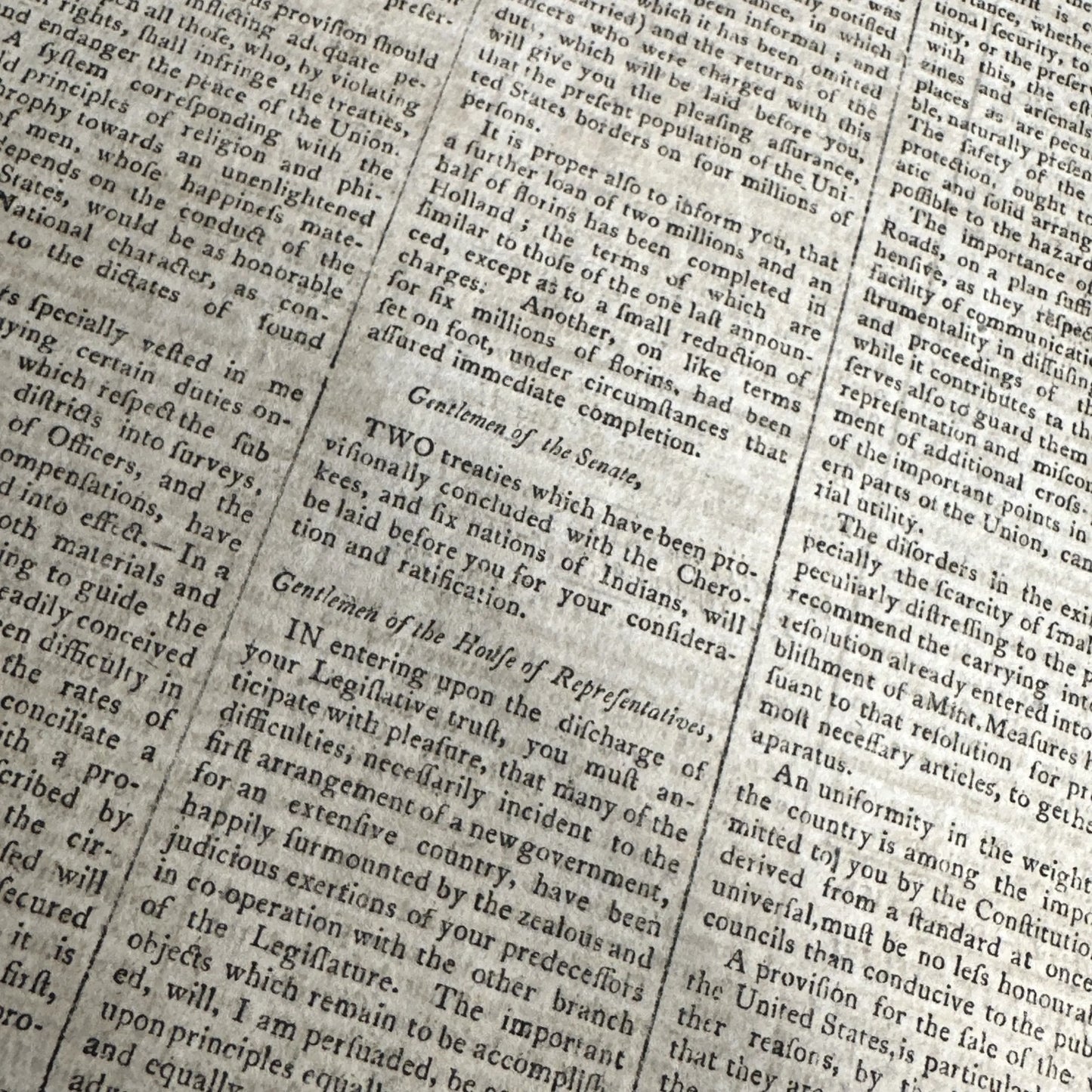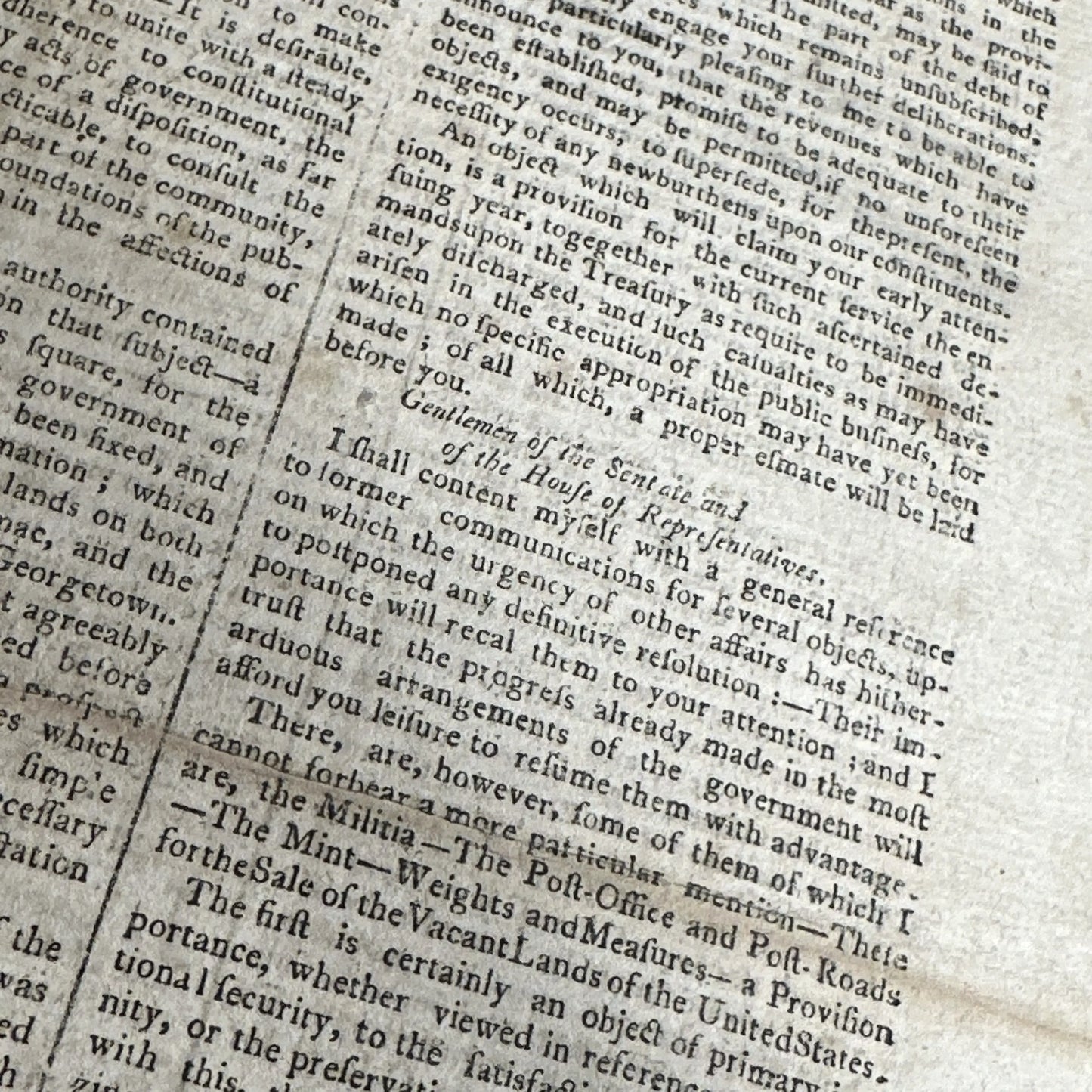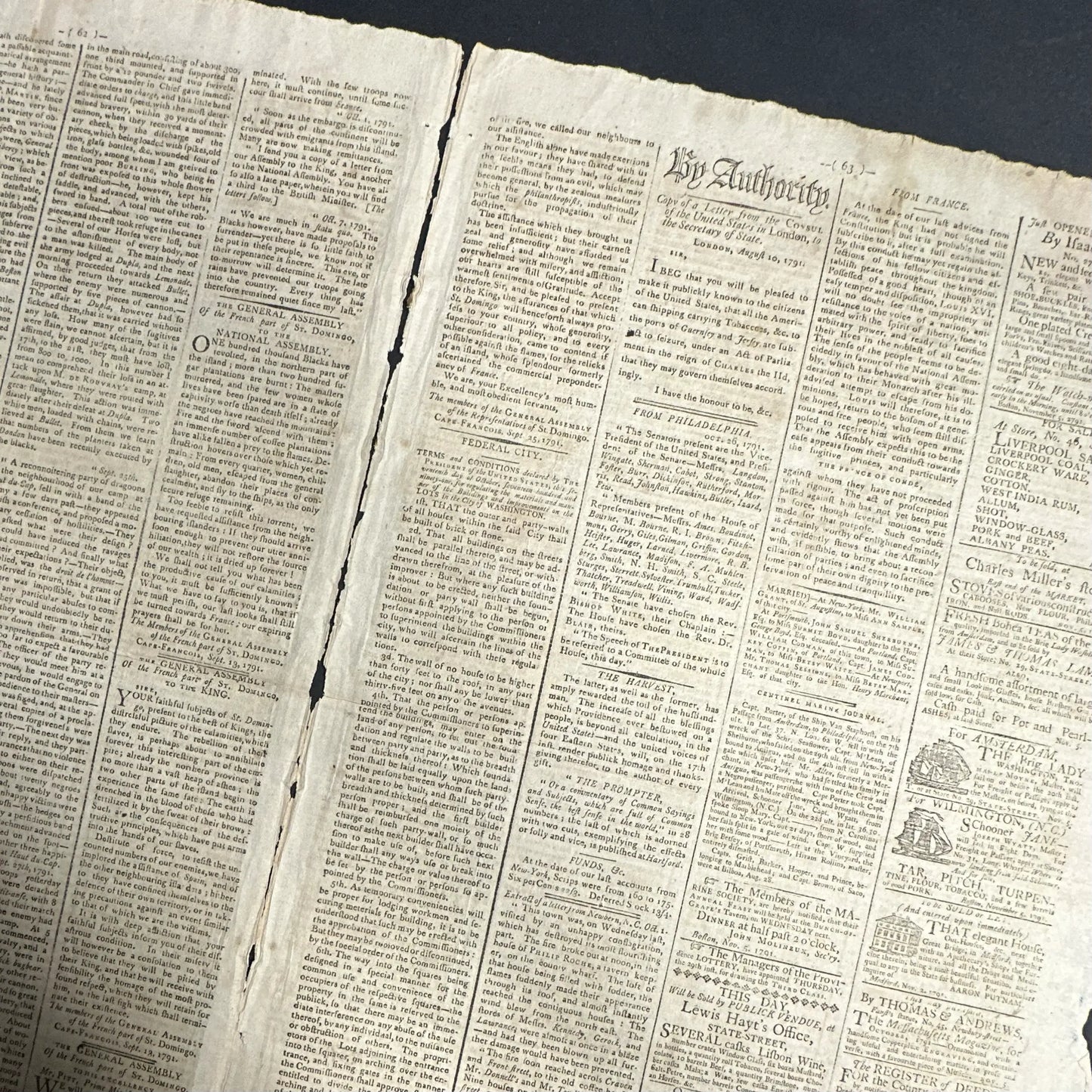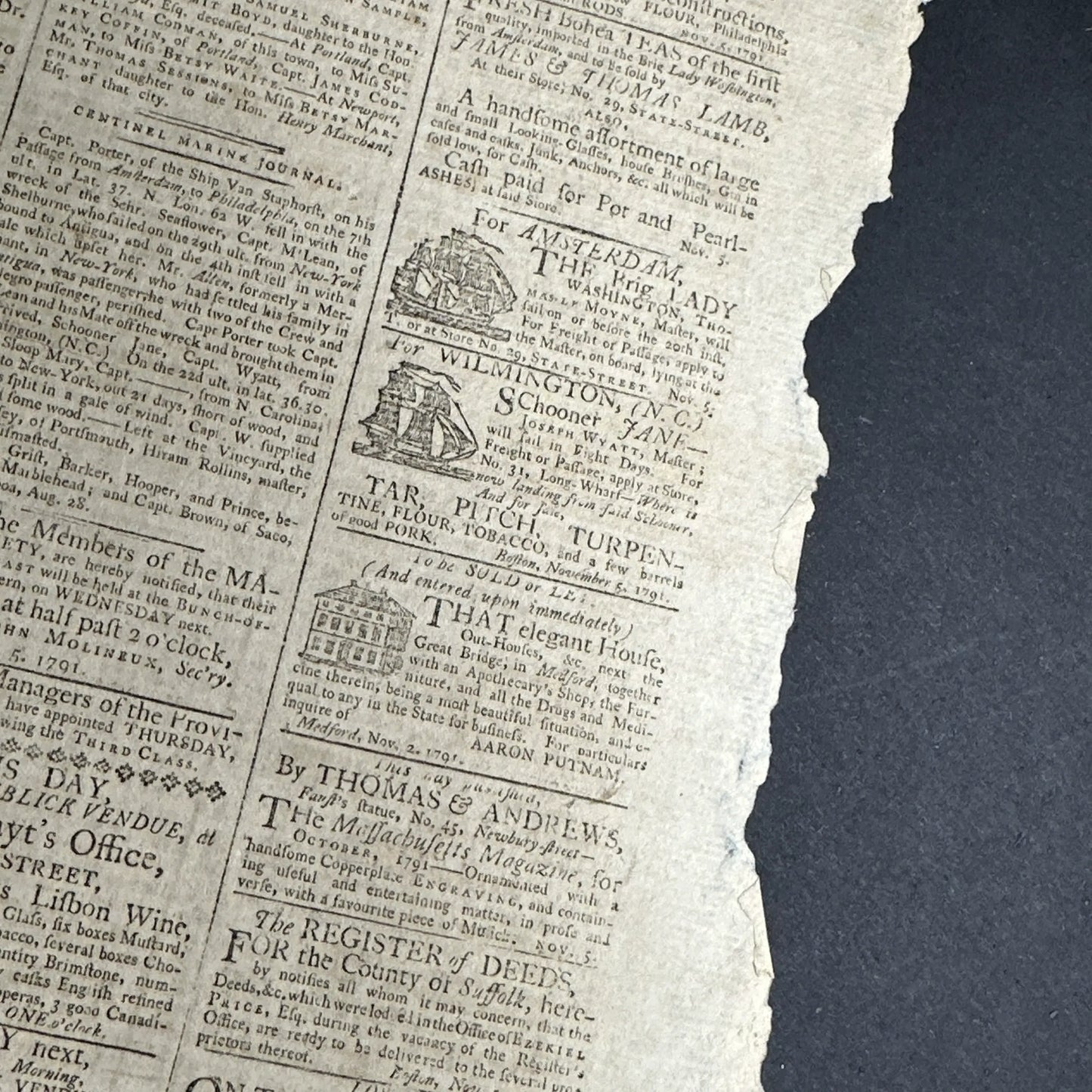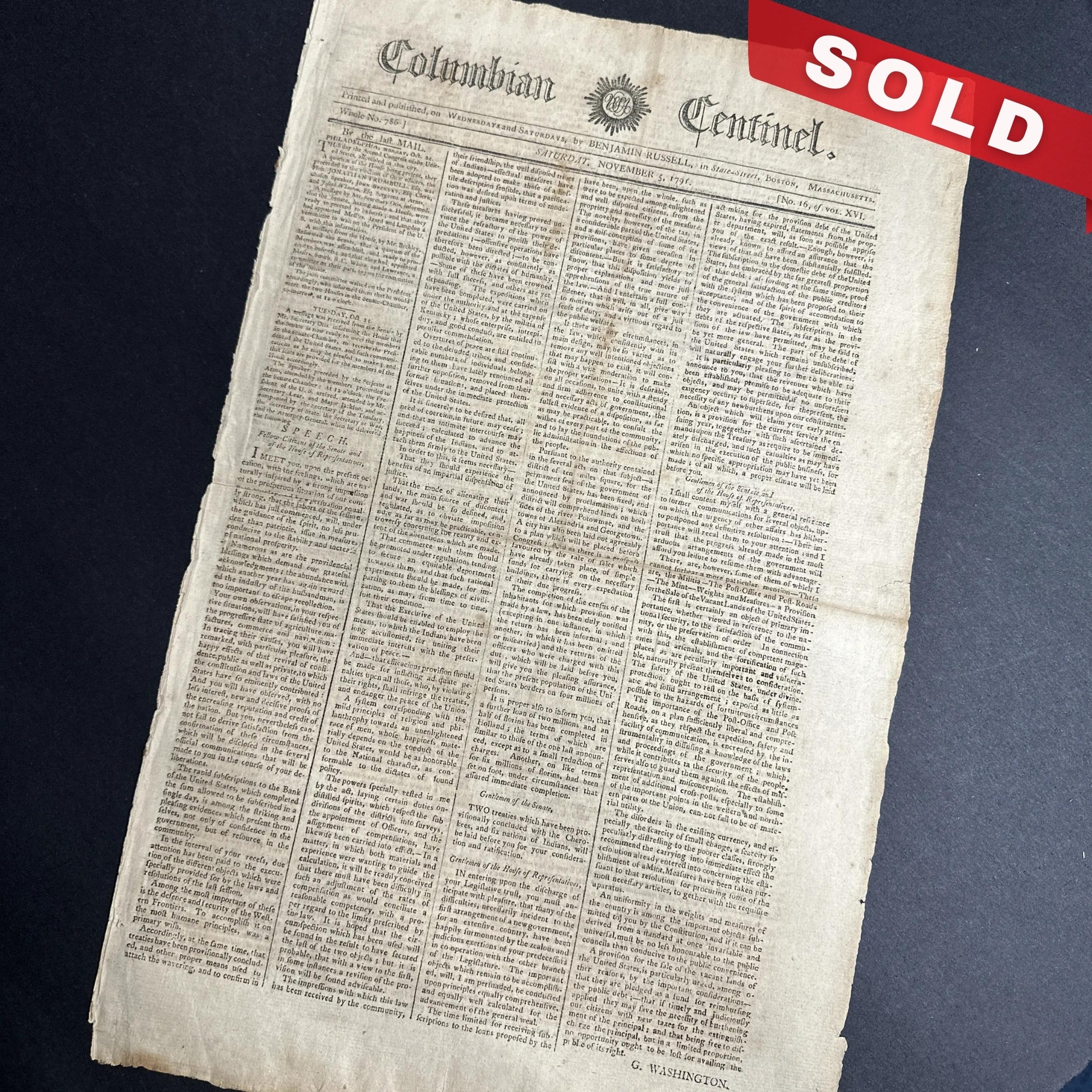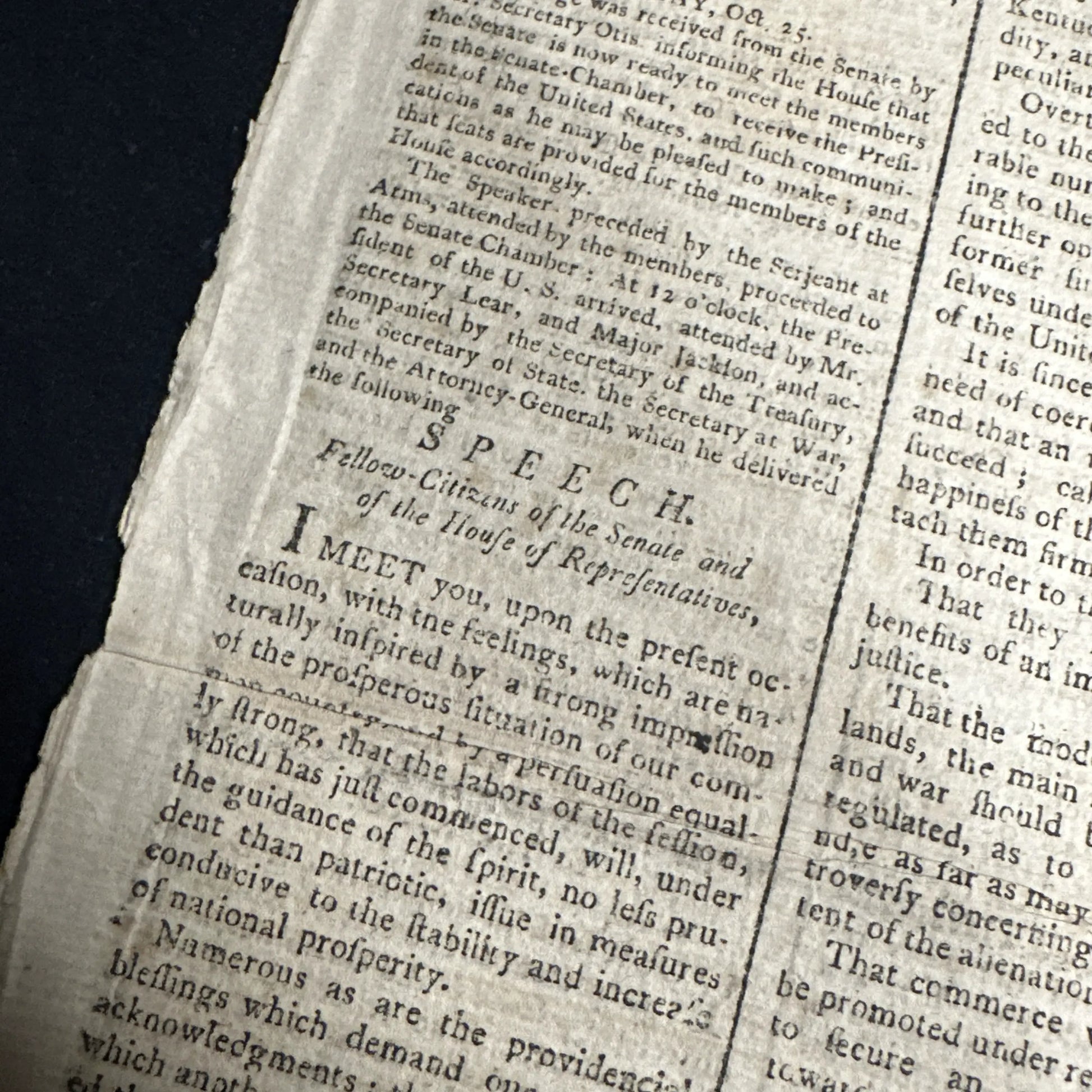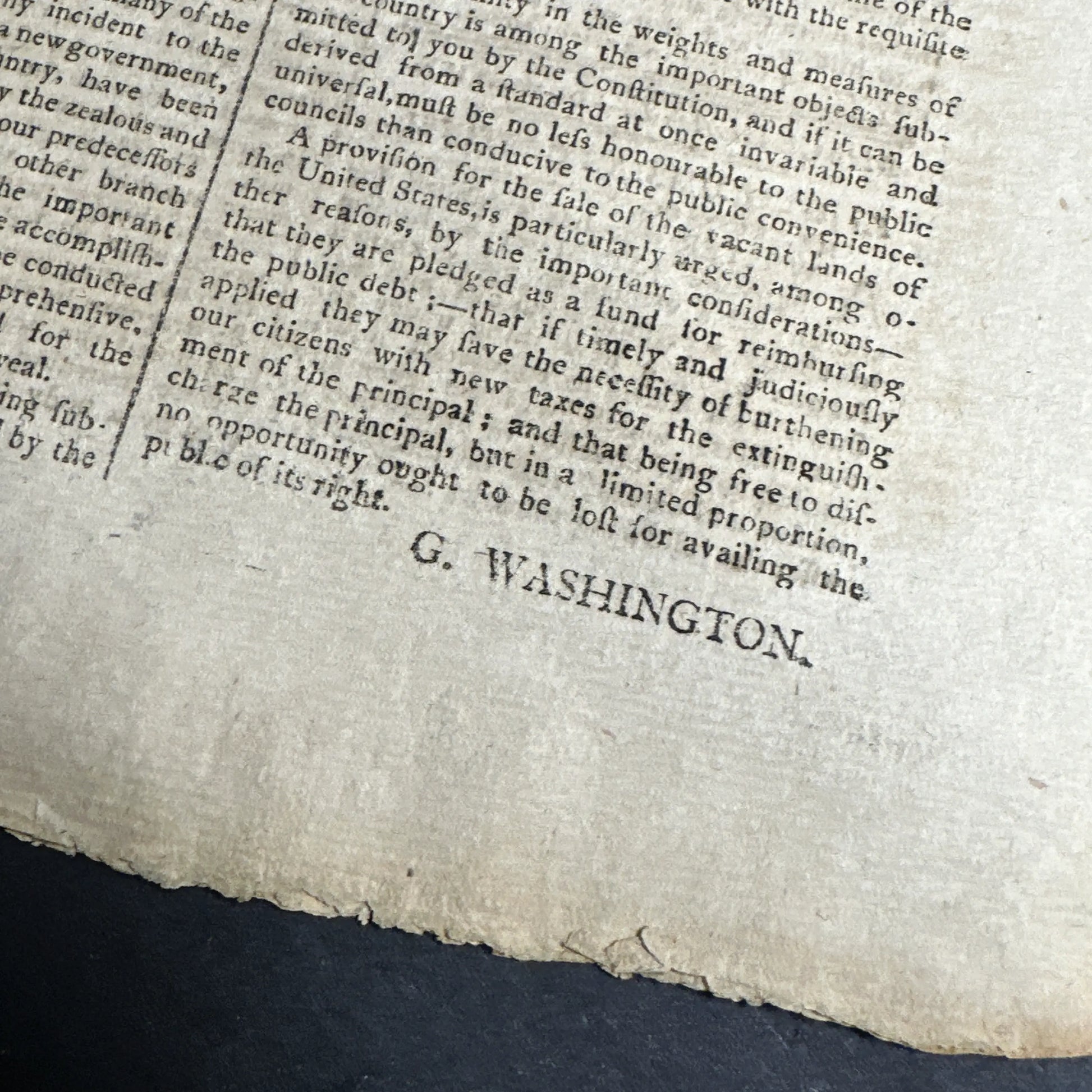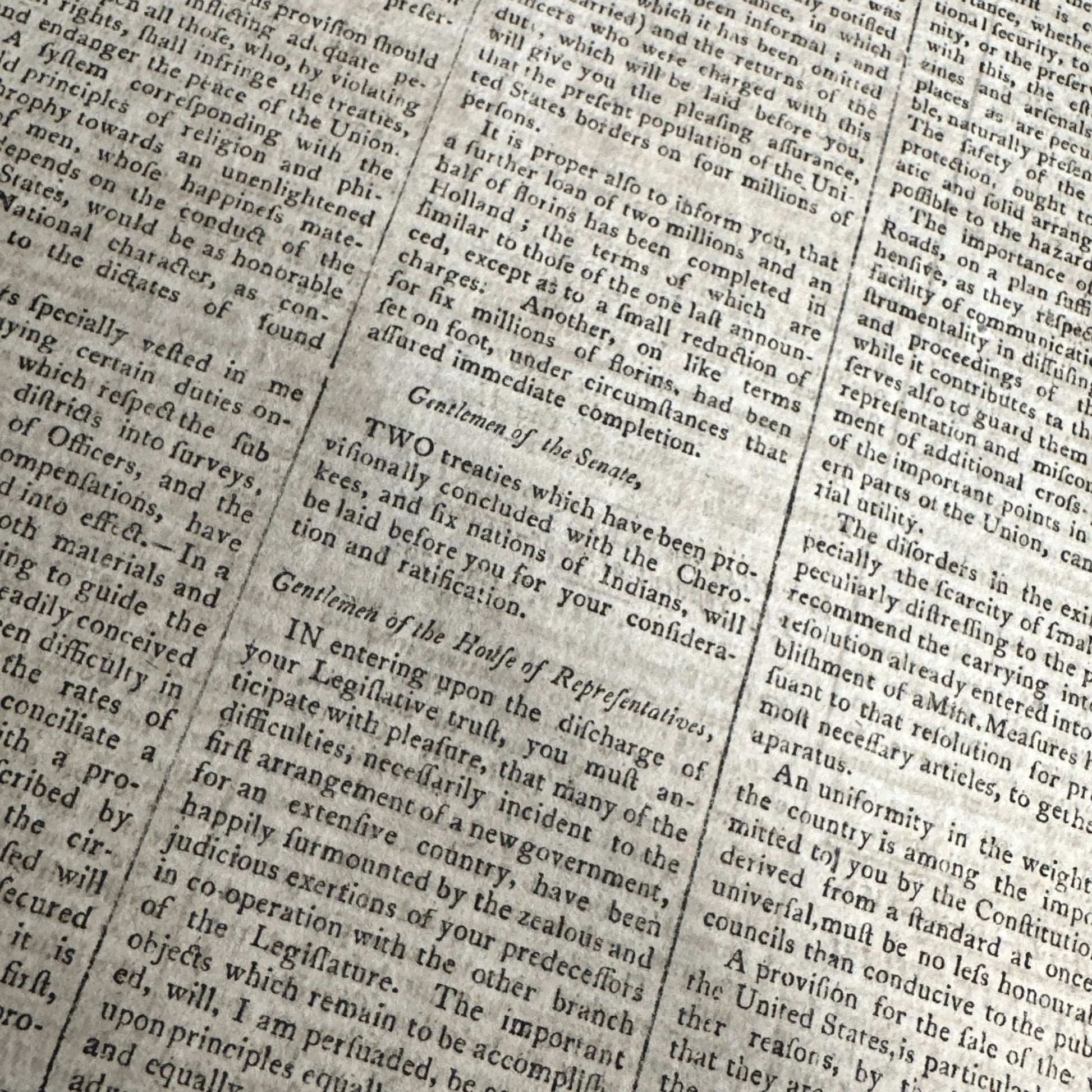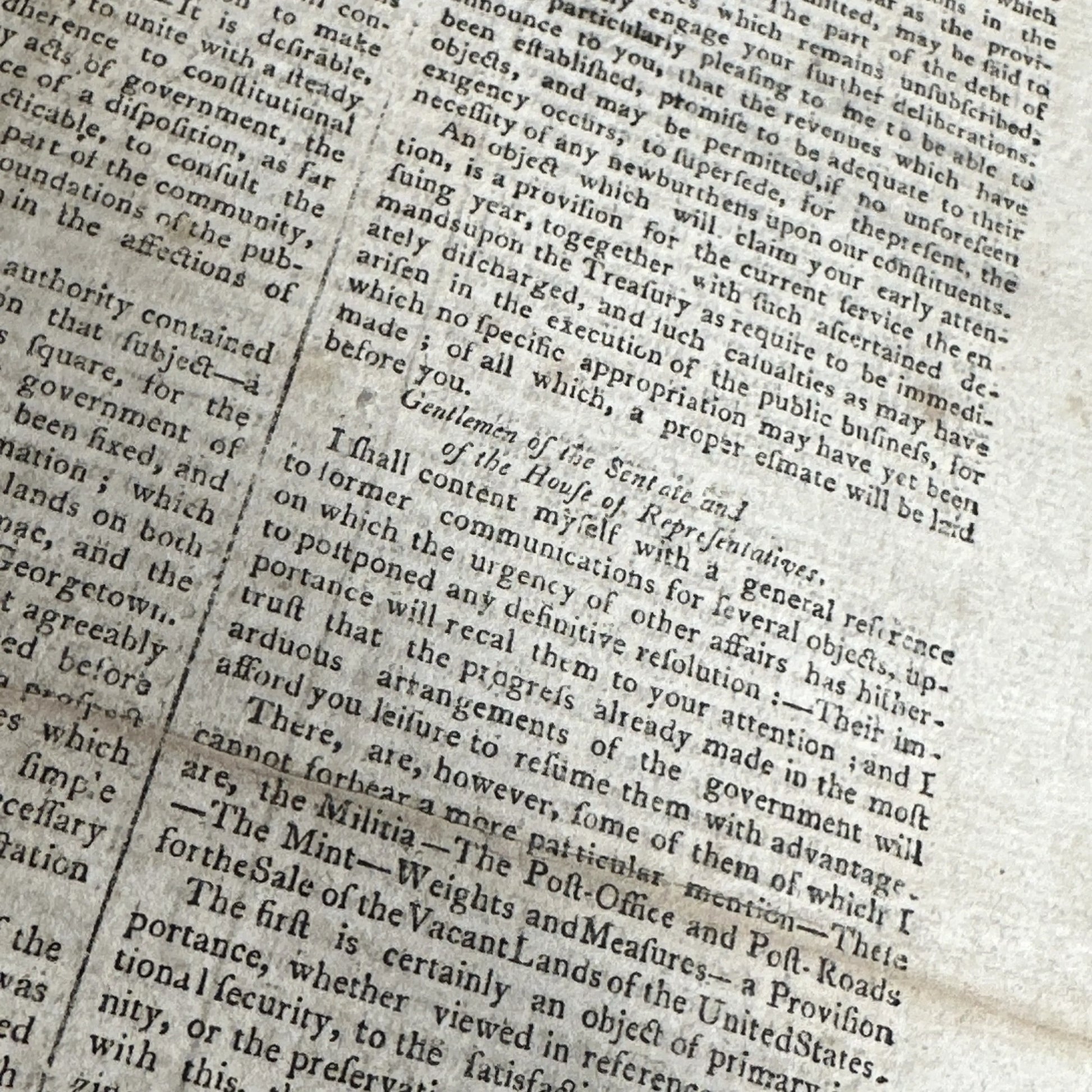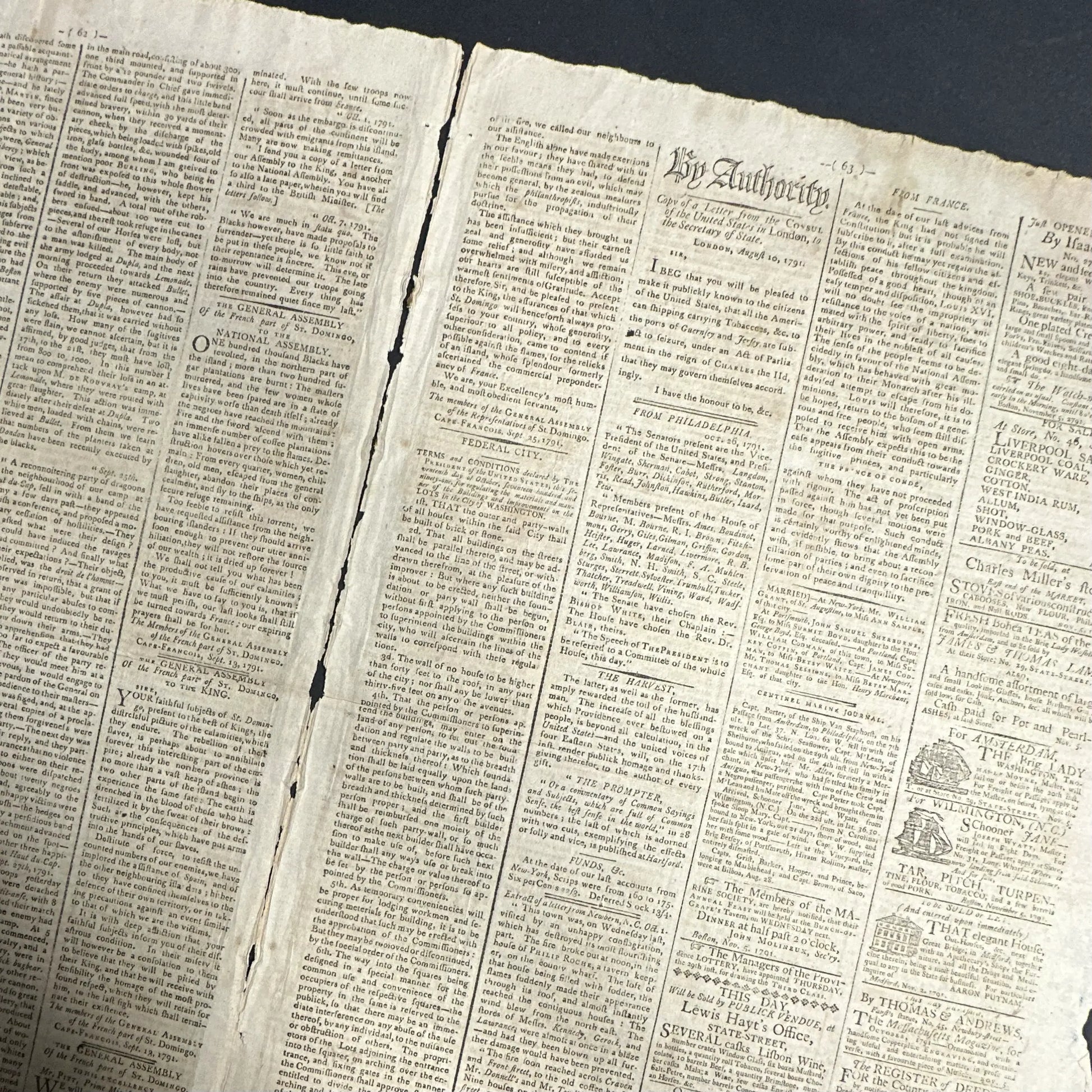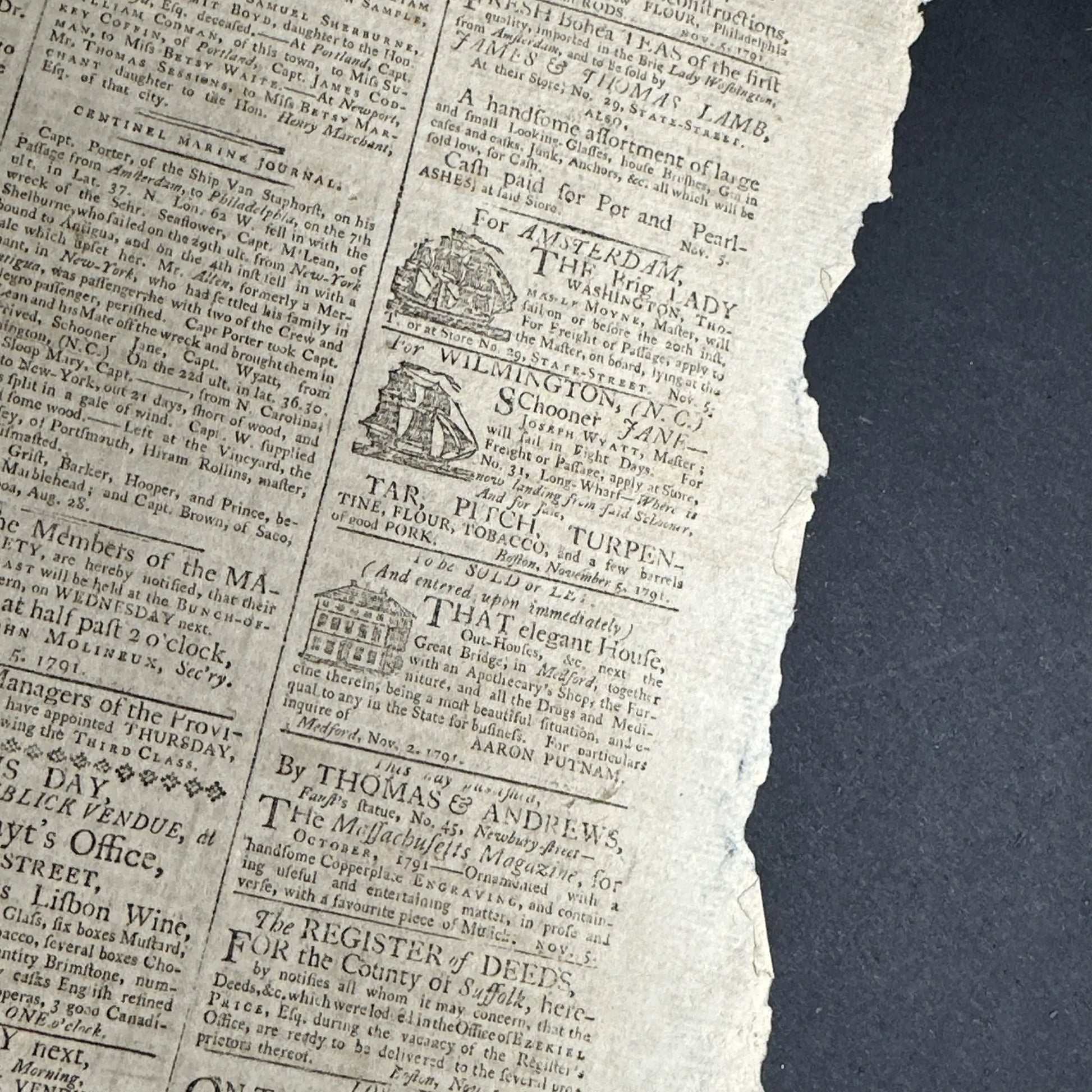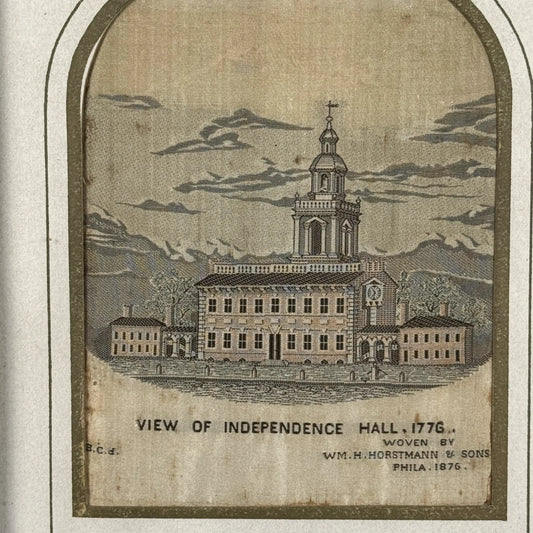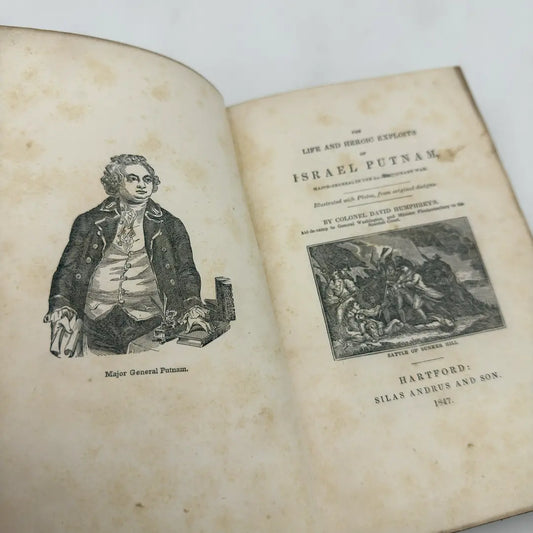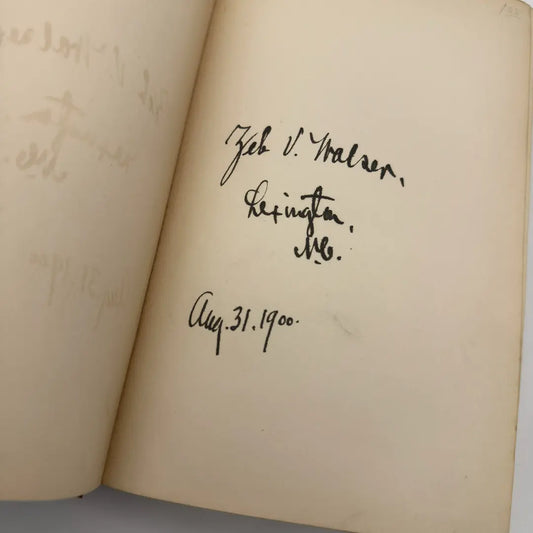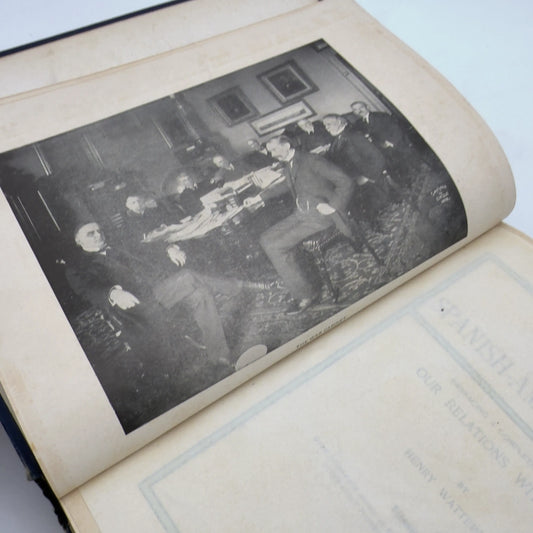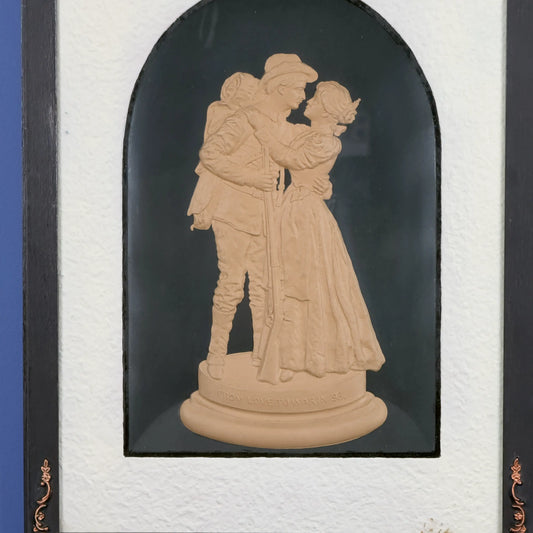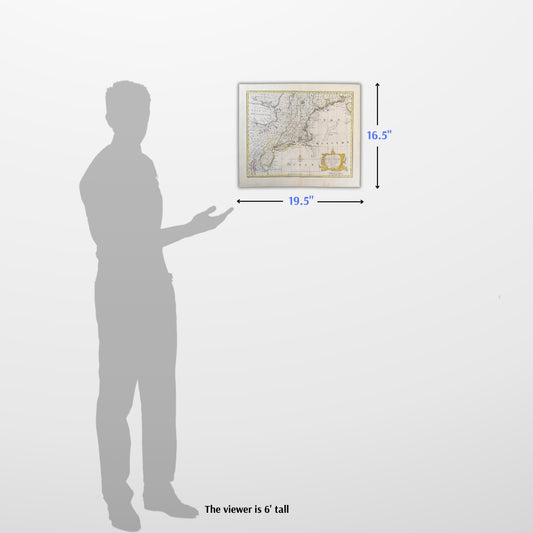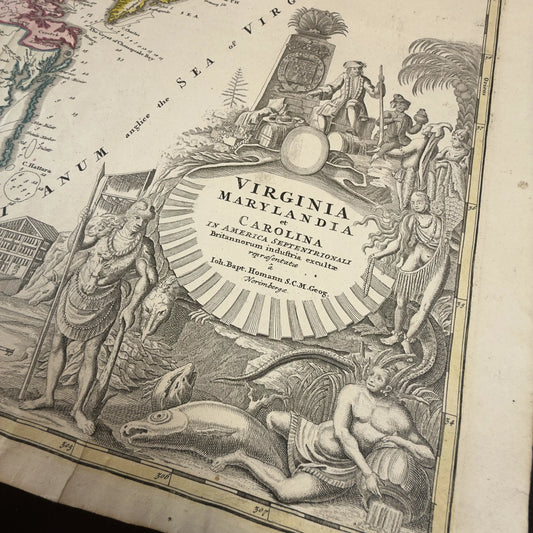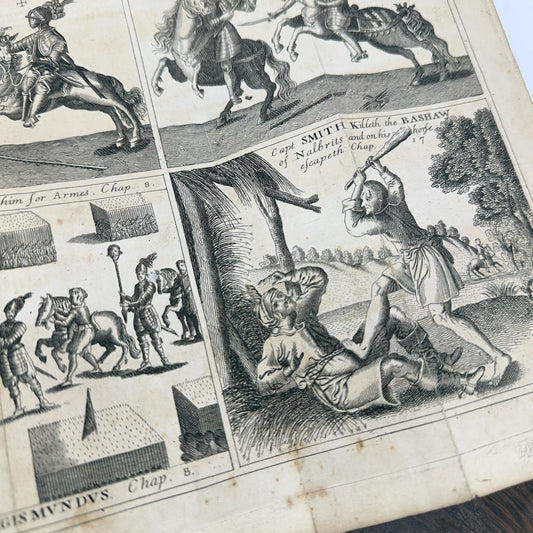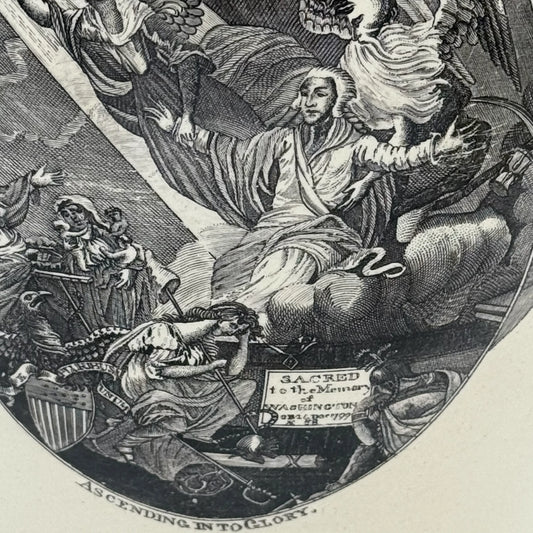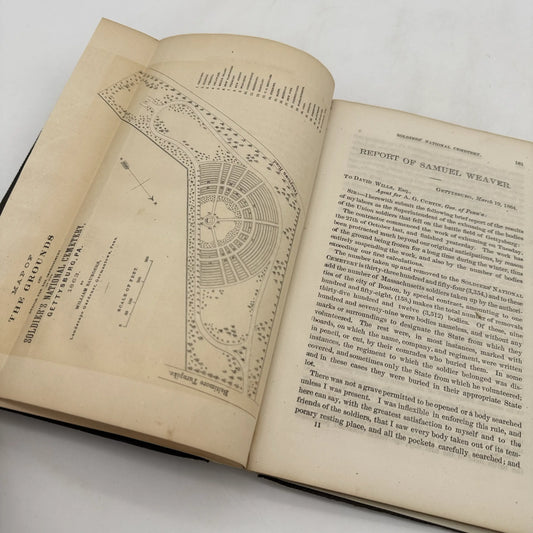1791 Newspaper reporting Washington’s State of the Union Address
1791 Newspaper reporting Washington’s State of the Union Address
Updated at 9:40 pm Eastern on March 7: This has been sold.
GEORGE WASHINGTON, State of the Union Message in the Columbian Centinel, November 5, 1791. Newspaper. Boston, Mass.: Benjamin Russell. 4 pp., 11¼ x 18 in.
Includes complete front-page printing of George Washington’s annual message to Congress of October 25, 1791:
“The rapid subscriptions to the Bank of the United States, which completed the sum allowed to be subscribed in a single day, is among the striking and pleasing evidences which present themselves, not only of confidence in the Government, but of resource in the community.”
“It is sincerely to be desired that all need of coercion in future may cease and that an intimate intercourse may succeed, calculated to advance the happiness of the Indians and to attach them firmly to the United States.”
See the historical background below for more excerpts.
Issue also includes correspondence regarding the early actions of the Haitian Revolution, with the revolt against French colonial rule in Saint-Domingue (p2/c2-p3/c1); an October 17, 1791 proclamation by George Washington with regulations regarding building in the City of Washington, D.C. (p3/c1); and a variety of advertisements and notices, including one seeking information about thieves who stole sixteen pair of silk stockings from a store (p4/c1).
I discuss this newspaper and a newspaper on Lincoln's State of the Union Address in this video with Seth Kaller, who provides great historical context for the addresses.
— Lee Wright | Founder
Size: Newspaper: 11¼ x 18 in. Framed size will be larger.
Shipping: $50. Allow two weeks for framing and delivery. Sent via UPS with signature required.
Historical background
George Washington 1791 State of the Union Address to Congress, including Finance and Native American Policy, Hinting at Opposition to Whiskey Tax
Both houses of Congress achieved quorums on October 24, 1791. A committee of senators and representatives met with Washington and informed him that Congress was ready to receive any communication from him. He told the committee he would meet with Congress the next day at noon. On October 25, Washington delivered his address to Congress in the Senate Chamber in Congress Hall. It was the second annual message he delivered to Congress in Philadelphia after the federal government had agreed to move there from New York City for ten years, while awaiting the creation of a permanent capital on the Potomac River.
Washington devoted approximately one-fifth of his address to articulating a federal Indian policy. Although paternalistic toward “an unenlightened race of men, whose happiness materially depends on the conduct of the United States,” Washington’s policies were considerably more benign than those of later presidents like Andrew Jackson.
The Northwest Indian War persisted from 1785 to 1795 between some 45,000 Native Americans in the Northwest Territory and an increasing number of American settlers. Despite major Native American victories in 1790 and 1791 in which approximately 1,000 soldiers and militiamen were killed, the United States continued to assert its sovereignty over the area based on the 1783 Treaty of Paris. In 1792, Native Americans killed two separate peace emissaries, believing them to be spies. In August 1794, the Legion of the United States under General Anthony Wayne decisively defeated the Native Americans at the Battle of Fallen Timbers. This American victory led to the Treaty of Greenville, in which Native Americans ceded most of Ohio and a portion of Illinois country to the United States. Hoping to take advantage of American attention on the northwestern frontier, France and Spain encouraged the Chickamauga in the Southeast in their hostility to American settlers.
In his annual message, Washington refers to “some degree of discontent” regarding the whiskey excise tax established by Congress in March 1791. He expressed hope, however, that “proper explanations” would cause unrest to “give way to motives which arise out of a just sense of duty and a virtuous regard to the public welfare.” Among farmers on the frontier, the tax immediately became controversial, and they signed petitions against it. In several counties in southwestern Pennsylvania, opponents organized to repeal the law or to prevent its operation. After a second convention in Pittsburgh in August 1792 discussed resistance to the tax, Alexander Hamilton drafted a presidential proclamation that Washington issued in September 1792 denouncing such resistance. After more hostility toward tax collectors in 1793 and subpoenas against distillers who had not paid the tax in 1794, tensions rose into armed conflict in the summer of 1794. In August 1794, Washington called for the militia from several states to suppress the rebellion, and the show of force ended the rebellion without violence.
In July 1790, Congress passed the Residence Act to place the national capital on the Potomac River and authorized the president to select the specific site. Because Washington wanted to incorporate the city of Alexandria, Virginia, Congress amended the act to allow Alexandria to be a part of the ten-mile-square federal District of Columbia. All federal buildings were built on the Maryland side of the river. Early in 1791, Washington appointed Pierre Charles L’Enfant to develop a plan for the new city. In 1846, Congress authorized the return of the Virginia portion of the district to that state.
Selected excerpts; see below for the entire transcript
“The rapid subscriptions to the Bank of the United States, which completed the sum allowed to be subscribed in a single day, is among the striking and pleasing evidences which present themselves, not only of confidence in the Government, but of resource in the community.” (p1/c1)
“at the same time the treaties have been provisionally concluded and other proper means used to attach the wavering, and to confirm in their friendship, the well disposed tribes of Indians—effectual measures have been adopted to make those of a hostile description sensible that a pacification was desired upon terms of moderation and justice.” (p1/c1-2)
“These measures having proved unsuccessful, it became necessary to convince the refractory of the power of the United States to punish their depredations. Offensive operations have therefore been directed, to be conducted, however, as consistently as possible with the dictates of humanity. Some of these have been crowned with full success and others are yet depending. The expeditions which have been completed were carried on under the authority and at the expense of the United States by the militia of Kentucky, whose enterprise, intrepidity, and good conduct are entitled of peculiar commendation.” (p1/c2)
“It is sincerely to be desired that all need of coercion in future may cease and that an intimate intercourse may succeed, calculated to advance the happiness of the Indians and to attach them firmly to the United States.
“In order to this, it seems necessary—
“That they should experience the benefits of an impartial dispensation of justice.
“That the mode of alienating their lands, the main source of discontent and war, should be so defined and regulated as to obviate imposition and as far as may be practicable controversy concerning the reality and extent of the alienations which are made.
“That commerce with them should be promoted under regulations tending to secure an equitable deportment toward them, and that such rational experiments should be made for imparting to them the blessings of civilization as may from time to time suit their condition.
“That the Executive of the United States should be enabled to employ the means to which the Indians have been long accustomed for uniting their immediate interests with the preservation of peace.
“And that efficacious provision should be made for inflicting adequate penalties upon all those who, by violating their rights, shall infringe the treaties and endanger the peace of the Union.” (p1/c2)
“The powers specially vested in me by the act laying certain duties on distilled spirits, which respect the subdivisions of the districts into surveys, the appointment of officers, and the assignment of compensations, have likewise carried into effect.... The novelty, however, of the tax in a considerable part of the United States and a misconception of some of its provisions have given occasion in particular places to some degree of discontent; but it is satisfactory to know that this disposition yields to proper explanations and more just apprehensions of the true nature of the law, and I entertain a full confidence that it will in all give way to motives which arise out of a just sense of duty and a virtuous regard to the public welfare.” (p1/c2-3)
“Pursuant to the authority contained in the several acts on that subject, a district of ten miles square for the permanent seat of the Government of the United State has been fixed and announced by proclamation, which district will comprehend lands on both sides of the river Potomac and the towns of Alexandria and Georgetown.” (p1/c3)
“The completion of the census of the inhabitants, for which provision was made by law, has been duly notified...and the returns...will give you the pleasing assurance that the present population of the United States borders on four millions of persons.” (p1/c3)
“It is particularly pleasing to me to be able to announce to you that the revenues which have been established promise to be adequate to their objects, and may be permitted, if no unforeseen exigency occurs, to supersede for the present the necessity of any new burthens upon our constituents.” (p1/c4)
George Washington (1732-1799) was born in Westmoreland County, Virginia, and educated by private tutors. In 1749, he became a surveyor for Culpeper County, Virginia, and spent several years surveying land in western Virginia. Washington fought as an officer in the French and Indian War and the French captured him at Fort Necessity in 1754. He later became General Edward Braddock’s aide-de-camp, and helped rally the troops after Braddock’s death at the disastrous Battle of Monongahela. In 1759, Washington married the wealthy widow Martha Dandridge Custis, and they moved to his plantation Mount Vernon, where they raised her two surviving children. Washington was an innovative farmer, owner of hundreds of slaves, and emerging leader in Virginia’s planter elite. Selected as a delegate to the First and Second Continental Congresses, Washington was appointed General and Commander-in-Chief of the Continental Army when it was created in June 1775. After victory at Boston, defeat at New York, perilous winter encampments and many more battles, Washington accepted the surrender of Lord Cornwallis at Yorktown, Virginia, in October 1781. After the Treaty of Paris ended the war officially in October 1783, Washington resigned and briefly retired to private life. He served as a Virginia delegate to the Constitutional Convention in 1787, and the Electoral College unanimously elected him the first President of the United States in 1789 and again in 1792. His two terms set many precedents for the Presidency, and he exercised broad powers, appointing all members of the U.S. Supreme Court and establishing the new nation on a firm foundation with the assistance of his Secretary of State Thomas Jefferson and his Secretary of the Treasury Alexander Hamilton. He adopted an isolationist foreign policy, kept the nation out of the French Revolutionary Wars that engulfed Europe, and supported the controversial Jay Treaty. He supported Hamilton’s proposals for the assumption of state debts and the creation of a mint and national bank. He retired again to Mount Vernon in March 1797, but during the Quasi-War with France, Washington accepted a commission as lieutenant general from his successor John Adams and served as senior officer in the U.S. Army from July 1798 until his death in December 1799.
Columbian Centinel (1790-1840) was a semi-weekly newspaper published in Boston by Benjamin Russell. It continued Russell and William Warden’s Massachusetts Centinel (1784-1790) and was the most influential newspaper in Massachusetts after the American Revolution. It was strongly Federalist in outlook and had the largest circulation in Boston until 1800. In 1828, Russell sold the Centinel to Joseph T. Adams and Thomas Hudson, who continued publishing it until 1840, when it merged with several other newspapers
Complete Transcript of Washington’s 1791 State of the Union Message
Fellow-Citizens of the Senate and House of Representatives:
I meet you upon the present occasion, with the feelings which are naturally inspired by a strong impression of the prosperous situations of our common country, and by a persuasion equally strong that the labors of the session which has just commenced will, under the guidance of a spirit no less prudent than patriotic, issue in measures conducive to the stability and increase of national prosperity.
Numerous as are the providential blessings which demand our grateful acknowledgments, the abundance with which another year has again rewarded the industry of the husbandman is too important to escape recollection.
Your own observations in your respective situations will have satisfied you of the progressive state of agriculture, manufactures, commerce, and navigation. In tracing their causes you will have remarked with particular pleasure the happy effects of that revival of confidence, public as well as private, to which the Constitution and laws of the United States have so eminently contributed; and you will have observed with no less interest new and decisive proofs of the increasing reputation and credit of the nation. But you, nevertheless, cannot fail to derive satisfaction from the confirmation of these circumstances which will be disclosed in the several official communications that will be made to you in the course of your deliberations.
The rapid subscriptions to the Bank of the United States, which completed the sum allowed to be subscribed in a single day, is among the striking and pleasing evidences which present themselves, not only of confidence in the Government, but of resource in the community.
In the interval of your recess due attention has been paid to the execution of the different objects which were specially provided for by the laws and resolutions of the last session.
Among the most important of these is the defense and security of the western frontiers. To accomplish it on the most humane principles was a primary wish.
Accordingly, at the same time the treaties have been provisionally concluded and other proper means used to attach the wavering and to confirm in their friendship the well-disposed tribes of Indians, effectual measures have been adopted to make those of a hostile description sensible that a pacification was desired upon terms of moderation and justice.
Those measures having proved unsuccessful, it became necessary to convince the refractory of the power of the United States to punish their depredations. Offensive operations have therefore been directed, to be conducted, however, as consistently as possible with the dictates of humanity. Some of these have been crowned with full success and others are yet depending. The expeditions which have been completed were carried on under the authority and at the expense of the United States by the militia of Kentucky, whose enterprise, intrepidity, and good conduct are entitled of peculiar commendation.
Overtures of peace are still continued to the deluded tribes, and considerable numbers of individuals belonging to them have lately renounced all further opposition, removed from their former situations, and placed themselves under the immediate protection of the United States.
It is sincerely to be desired that all need of coercion in future may cease and that an intimate intercourse may succeed, calculated to advance the happiness of the Indians and to attach them firmly to the United States.
In order to this it seems necessary –
That they should experience the benefits of an impartial dispensation of justice.
That the mode of alienating their lands, the main source of discontent and war, should be so defined and regulated as to obviate imposition and as far as may be practicable controversy concerning the reality and extent of the alienations which are made.
That commerce with them should be promoted under regulations tending to secure an equitable deportment toward them, and that such rational experiments should be made for imparting to them the blessings of civilization as may from time to time suit their condition.
That the Executive of the United States should be enabled to employ the means to which the Indians have been long accustomed for uniting their immediate interests with the preservation of peace.
And that efficacious provision should be made for inflicting adequate penalties upon all those who, by violating their rights, shall infringe the treaties and endanger the peace of the Union.
A system corresponding with the mild principles of religion and philanthropy toward an unenlightened race of men, whose happiness materially depends on the conduct of the United States, would be as honorable to the national character as conformable to the dictates of sound policy.
The powers specially vested in me by the act laying certain duties on distilled spirits, which respect the subdivisions of the districts into surveys, the appointment of officers, and the assignment of compensations, have likewise carried into effect. In a manner in which both materials and experience were wanting to guide the calculation it will be readily conceived that there must have been difficulty in such an adjustment of the rates of compensation as would conciliate a reasonable competency with a proper regard to the limits prescribed by the law. It is hoped that the circumspection which has been used will be found in the result to have secured the last of the two objects; but it is probable that with a view to the first in some instances a revision of the provision will be found advisable.
The impressions with which this law has been received by the community have been upon the whole such as were to be expected among enlightened and well-disposed citizens from the propriety and necessity of the measure. The novelty, however, of the tax in a considerable part of the United States and a misconception of some of its provisions have given occasion in particular places to some degree of discontent; but it is satisfactory to know that this disposition yields to proper explanations and more just apprehensions of the true nature of the law, and I entertain a full confidence that it will in all give way to motives which arise out of a just sense of duty and a virtuous regard to the public welfare.
If there are any circumstances in the law which consistently with its main design may be so varied as to remove any well-intentioned objections that may happen to exist, it will consist with a wise moderation to make the proper variations. It is desirable on all occasions to unite with a steady and firm adherence to constitutional and necessary acts of Government the fullest evidence of a disposition as far as may be practicable to consult the wishes of every part of the community and to lay the foundations of the public administration in the affections of the people.
Pursuant to the authority contained in the several acts on that subject, a district of ten miles square for the permanent seat of the Government of the United State has been fixed and announced by proclamation, which district will comprehend lands on both sides of the river Potomac and the towns of Alexandria and Georgetown. A city has also been laid out agreeably to a plan which will be placed before Congress, and as there is a prospect, favored by the rate of sales which have already taken place, of ample funds for carrying on the necessary public buildings, there is every expectation of their due progress.
The completion of the census of the inhabitants, for which provision was made by law, has been duly notified (excepting one instance in which the return has been informal, and another in which it has been omitted or miscarried), and the returns of the officers who were charged with this duty, which will be laid before you, will give you the pleasing assurance that the present population of the United States borders on four millions of persons.
It is proper also to inform you that a further loan of two millions and a half of florins has been completed in Holland, the terms of which are similar to those of the one last announced, except as to a small reduction of charges. Another, on like terms, for six millions of florins, had been set on foot under circumstances that assured an immediate completion.
Gentlemen of the Senate:
Two treaties which have been provisionally concluded with the Cherokees, and Six Nations of Indians, will be laid before you for your consideration and ratification.
Gentlemen of the House of Representatives:
In entering upon the discharge of your legislative trust you must anticipate with pleasure that many of the difficulties necessarily incident to the first arrangements of a new government for an extensive country have been happily surmounted by the zealous and judicious exertions of your predecessors in cooperation with the other branch of the Legislature. The important objects which remain to be accomplished will, I am persuaded, be conducted upon principles equally comprehensive and equally well calculated of the advancement of the general weal.
The time limited for receiving subscriptions to the loans proposed by the act making provision for the debt of the United States having expired, statements from the proper department will as soon as possible apprise you of the exact result. Enough, however, is known already to afford an assurance that the views of that act have been substantially fulfilled. The subscription in the domestic debt of the United States has embraced by far the greatest proportion of that debt, affording at the same time proof of the general satisfaction of the public creditors with the system which has been proposed to their acceptance and of the spirit of accommodation to the convenience of the Government with which they are actuated. The subscriptions in the debts of the respective States as far as the provisions of the law have permitted may be said to be yet more general. The part of the debt of the United States which remains unsubscribed will naturally engage your further deliberations.
It is particularly pleasing to me to be able to announce to you that the revenues which have been established promise to be adequate to their objects, and may be permitted, if no unforeseen exigency occurs, to supersede for the present the necessity of any new burthens upon our constituents.
An object which will claim your early attention is a provision for the current service of the ensuing year, together with such ascertained demands upon the Treasury as require to be immediately discharged, and such casualties as may have arisen in the execution of the public business, for which no specific appropriation may have yet been made; of all which a proper estimate will be laid before you.
Gentlemen of the Senate and of the House of Representatives:
I shall content myself with a general reference to former communications for several objects upon which the urgency of other affairs has hitherto postponed any definitive resolution. Their importance will recall them to your attention, and I trust that the progress already made in the most arduous arrangements of the Government will afford you leisure to resume them to advantage.
These are, however, some of them of which I cannot forbear a more particular mention. These are the militia, the post office and post roads, the mint, weights and measures, a provision for the sale of the vacant lands of the United States.
The first is certainly an object of primary importance, whether viewed in reference to the national security, to the satisfaction of the community, or to the preservation of order. In connection with this, the establishment of competent magazines and arsenals and the fortification of such places as are peculiarly important and vulnerable naturally present themselves to consideration. The safety of the United States under divine protection ought to rest on the basis of systematic and solid arrangements, exposed as little as possible to the hazards of fortuitous circumstances.
The importance of the post office and post roads on a plan sufficiently liberal and comprehensive, as they respect the expedition, safety, and facility of communication, is increased by their instrumentality in diffusing a knowledge of the laws and proceedings of the Government, which, while it contributes to the security of the people, serves also to guard them against the effects of misrepresentation and misconception. The establishment of additional cross posts, especially to some of the important points in the Western and Northern parts of the Union, cannot fail to be of material utility.
The disorders in the existing currency, and especially the scarcity of small change, a scarcity so peculiarly distressing to the poorer classes, strongly recommend the carrying into immediate effect the resolution already entered into concerning the establishment of a mint. Measures have been taken pursuant to that resolution for procuring some of the most necessary artists, together with the requisite apparatus.
An uniformity in the weights and measures of the country is among the important objects submitted to you by the Constitution, and if it can be derived from a standard at once invariable and universal, must be no less honorable to the public councils than conducive to the public convenience.
A provision for the sale of the vacant lands of the United States is particularly urged, among other reasons, by the important considerations that they are pledged as a fund for reimbursing the public debt; that if timely and judiciously applied they may save the necessity of burthening our citizens with new taxes for the extinguishment of the principal; and that being free to discharge the principal but in a limited proportion, no opportunity ought to be lost for availing the public of its right.
Go Washington.
Oct. 25, 1791.
Source: Seth Kaller for the commentary and historical background.
Made by America
Made by America
Almost all of the new products we offer are designed by us and made in America and most of our Rare Finds were made in America.
Our original designs are based on our nation’s history and our love of American history. Read more about other things we've created, including The History List, History Camp, and The Pursuit of History, in addition to The History List Store.
Every product that is made in America states that in the product description and includes the "Made in U.S.A." graphic.
